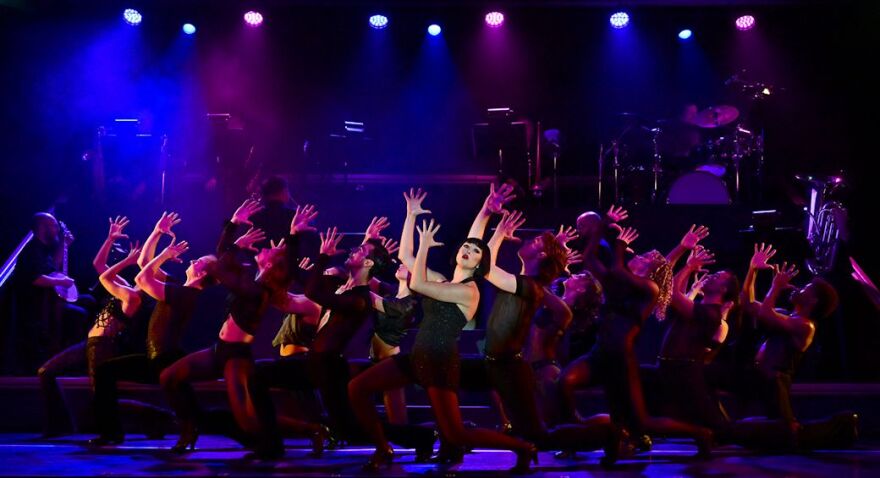Since its formation in October of 1964, Prather Productions has staged 238 shows. But Will Prather says the current production of “Chicago” far exceeds anything put on the boards over that long span.
“I could not be more proud as a producer to have the opportunity to basically produce a show that if you flew up to New York City, you would see almost the exact same production,” said Prather during his curtain speech on September 27. “Maybe a little bit younger, little bit more energy, little bit more eagerness, but this has really been the pinnacle of my opportunity to produce a show."

The level of acting, singing, dancing and choreography is, in fact, Broadway-caliber. But the show’s current six-week stint at Broadway Palm is just the first leg in a nearly year-long journey. On the musical’s opening night, Prather announced that he’ll be taking “Chicago” on a national tour.
“They get to go all over the country,” said Prather. “We actually open in Birmingham, Alabama, believe it or not. But after that, we spend almost 28 weeks going to 60 cities throughout North America, including Canada. We’re actually going to Monterrey, Mexico, San Francisco, California, and we’re actually going to close right back here in Miami, Florida, in June of next year.”

MORE INFORMATION:
“Chicago the Musical” is on stage through November 9, with shows scheduled Wednesday through Sunday evenings and select matinees. Tickets are available now and can be reserved by calling (239) 278-4422, visiting BroadwayPalm.com, or in person at 1380 Colonial Boulevard in Fort Myers.
Few shows come with more anticipation or fanfare than “Chicago.” With still-timely songs and libretto, groundbreaking choreography that pays homage to the great Bob Fosse, and a couple of powerful female leads who can both sing and dance, the musical has it all.
It’s no wonder that the six-time Emmy winner is the longest running American musical in Broadway history. In fact, only “Phantom of the Opera” has had a longer run.
The musical is based on true, headline-grabbing murders and their corresponding trials that took place in Chicago in the 1920s.
One murderous thread follows an aspiring Vaudevillian by the name of Roxie Hart (played by Ellie Roddy), who is arrested for murdering her extramarital lover. Born Beulah Annan, she was known as “the prettiest woman to ever commit murder in Chicago.”

The other subplot focuses on Velma Kelly (starring Taylor Lane), a nightclub entertainer and double-murderess that Roxie meets in jail.
Unaccustomed to sharing the spotlight with anyone, Velma does not take well to being upstaged by the spoiled, self-absorbed newcomer. Simmering emotion boils over when the feisty vixens fight for the spotlight after hiring the same headline-grabbing opportunist criminal defense attorney, Billy Flynn (portrayed by Connor Sullivan).

While attending Yale Drama School in the 1920s, former crime reporter and dramaturg Maurine Dallas Watkins began weaving these separate stories into a script for a drama with the working title of “Brave Little Woman.”
With themes involving narcissism, loyalty, betrayal, a broken criminal justice system and manipulating the press, “Chicago” may actually be even more on point today than it was when it was written in the 1920s and converted into a musical in 1975.
Songs like “All That Jazz,” “Cell Block Tango” and “Razzle Dazzle” reflect the current political gestalt with startling accuracy, while the rest of the show’s standards resonate across the board with Millennials to Boomers.
The music in “Chicago” was written by no other than John Kander (with Fred Ebb providing the lyrics). Just one year ago, the 96-year-old composer was on everyone’s mind. That’s because he teamed up with Lin-Manuel Miranda for a new Broadway Blockbuster, “New York, New York.” And Season 2 of “Schmigadoon” took place in Schmicago, a fictional world where theater geeks revel in parodies of the dark, sultry musicals of the '70s and '80s such as “Pippin,” “Sweeney Todd,” and of course, “Chicago.”

In all productions of “Chicago,” it is the dancing that ties everything together with the panache of a flamboyant red velvet Christmas bow. That’s especially true of Broadway’s Palm’s iteration of the show. The dancing doesn’t just amplify the story’s sexy, sordid appeal. It adds an exclamation point to the public’s love affair with sensationalized characters who thumb their noses at social expectation, mores and the rule of law.
When it premiered, “Chicago” gained notoriety for breaking the previously-sacrosanct theatrical fourth wall (in which actors pretend for the sake of the story that they cannot see or hear the audience). The characters in “Chicago” take turns talking directly to the audience. But rather than spoiling the continuity of the storyline, this device actually provides the audience with a ready portal into the action by making them confederates of the characters, complicit with such illicits as Roxie, Velma and the disturbingly seductive Billy Flynn.
And when it comes to “Chicago,” seduction is the operative term. The characters, in their skimpy costumes, could not be more alluring. Their stories could not be more prurient. The dancing is as steamy as a salsa on a sweltering Southwest Florida night. So prepare to be seduced!

Watkins' original version of “Chicago” debuted on Broadway at the Sam Harris Theatre in late December 1926 in a production directed by George Abbott, and starring Francine Larrimore as Roxie Hart, Juliette Crosby as Velma Kelly, and Edward Ellis as Billy Flynn. The drama ran for 172 performances.
Watkins' play made its debut in the city that inspired its creation in September 1927.
Actress Gwen Verdon and her choreographer husband, Bob Fosse, tried to get the rights to “Chicago” in the 1960s, but Watkins refused. By then, she’d repudiated her former, sinful life and no longer had any interest in seeing the play on stage, whether as a drama or a musical.
The equation changed after Watkins died. That’s when John Kander and Fred Ebb got involved.
"Chicago: A Musical Vaudeville" opened on Broadway in 1975 at the 46th Street Theatre. It starred Gwen Verdon as Roxie Hart, Chita Rivera as Velma Kelly, Jerry Orbach as Billy Flynn, Barney Martin as Amos Hart and Mary McCarty as Matron "Mama" Morton.
It had the misfortune of opening against Michael Bennett’s “A Chorus Line,” so the box office for the show was rather disappointing. It was saved from an early closing when Liza Minelli stepped in for Verdon after the latter suffered a freak vocal chord injury after inhaling a piece of the confetti during one of the numbers on stage. Minnelli had just won an Academy Award for her role in the Kander & Ebb film “Cabaret” and received rave reviews.
The musical ran for 936 performances and was nominated in 1976 for 10 Tony Awards, although it did not win any.
It was later revived, won six Emmys and went on to become the second-longest-running Broadway show.

To read more stories about the arts in Southwest Florida visit Tom Hall's website: SWFL Art in the News.
WGCU is your trusted source for news and information in Southwest Florida. We are a nonprofit public service, and your support is more critical than ever. Keep public media strong and donate now. Thank you.







